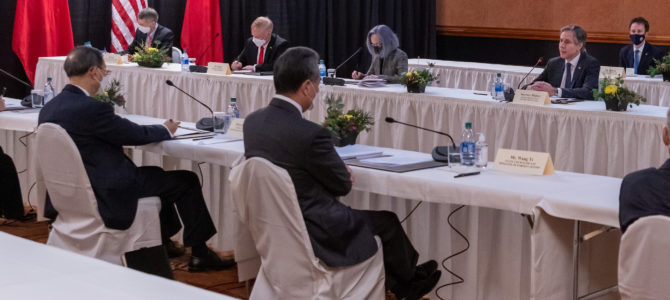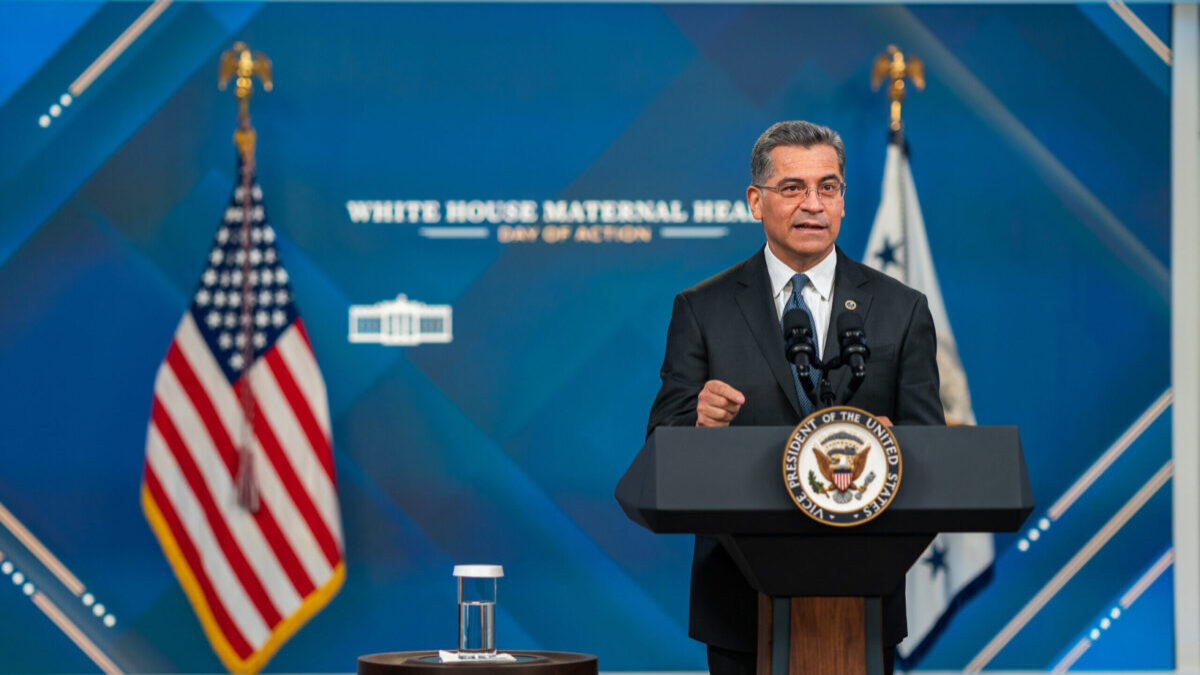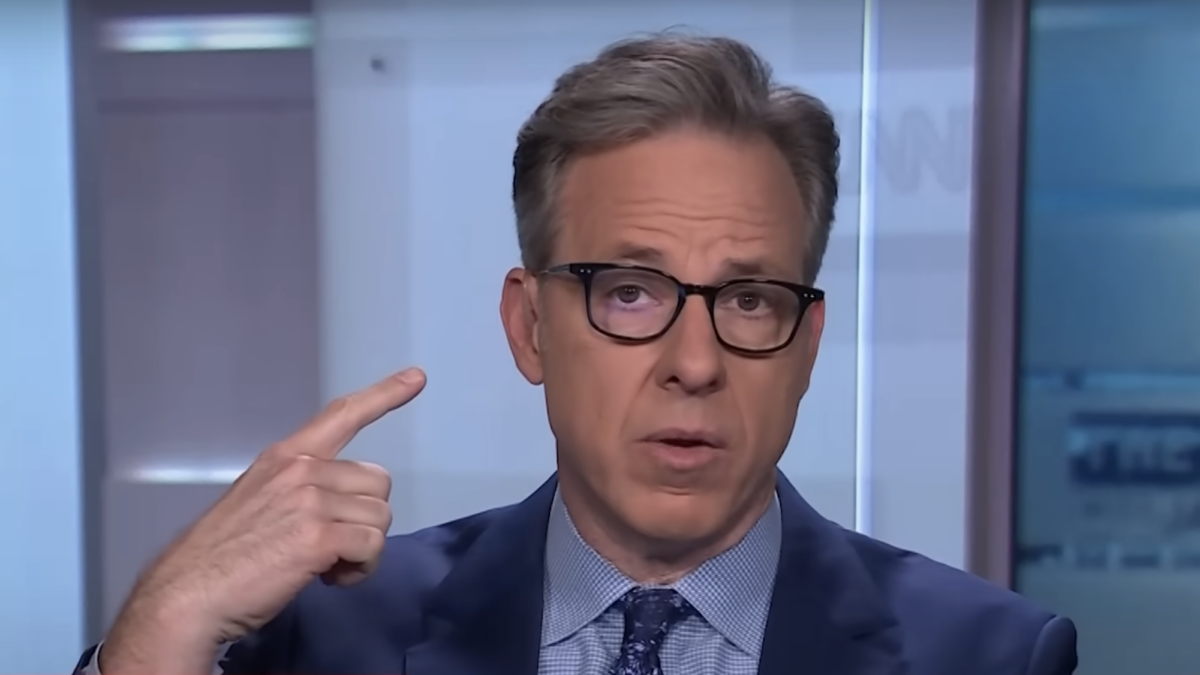
The Biden administration’s first high-level meeting with Communist China in Anchorage, Alaska, last week opened with a war of words, then closed with nothing meaningful to show in the end. Still, there are some critical takeaways from this important summit.
1. Diplomacy Is Political Theater for Domestic Audiences
The traditional understanding of diplomacy is that through dialogue and negotiations, countries seek to influence each other’s behaviors to achieve a mutually beneficial outcome while avoiding war. Diplomats are not soldiers. Therefore, when diplomats speak, especially in front of a camera, their tone tends to be measured, and their words tend to be vague. They generally avoid insulting the other side publicly, to leave room for negotiation and compromise.
The Chinese delegation’s behavior, however, broke this diplomatic norm. Even though China agreed to the summit schedule in advance, including a four-minute opening statement, Yang Jiechi, director of the Central Foreign Affairs Commission of the Chinese Communist Party (CCP) and the Chinese delegation lead, ignored the schedule by speaking for more than 15 minutes.
He filled his long remark with insults to the United States, including insisting that the United States “does not have the qualification to say that it wants to speak to China from a position of strength. The U.S. side was not even qualified to say such things even 20 years or 30 years back.” Yang’s contempt for the U.S. delegation and the nation they represent couldn’t have been more obvious.
Yang’s offensive words, his tone, and his attitude were all part of a performance meant for the audience back home, including his boss, the CCP’s leader Xi Jinping. Ever since he came to power, Xi has presented himself as the strongman China needs and the only one who will “return” China to its former glory. Xi unleashed a group of Chinese “wolf” diplomats to show Chinese people that his government knew how to stand up to those western powers that “humiliated” China in the past.
These Chinese “wolf” diplomats often break diplomatic protocols by acting aggressively and making offensive remarks to threaten human rights activists, journalists, and even government officials. They are combative and treat every criticism of China, no matter how legitimate it is, as a mortal threat to the longevity of the CCP’s rule in China.
They exploit Western social media’s openness by promoting CCP propaganda and spreading misinformation and conspiracies while suffering no consequences. Understandably, these “wolf” diplomats haven’t won many friends for China internationally, but they help Xi solidify his popularity among the growing Chinese nationalists.
Yang’s disdain of the United States in Alaska in front of the worldwide press served two purposes at home. First, it pleased Chinese nationalists. Yang’s condescending remarks were widely reported in China. The Global Times, a Chinese state media that often speaks on behalf of China’s nationalist movement, praised Yang for teaching the United States a good lesson by refuting the U.S. “arrogance in public.”
Second, many suspect Yang did what he did to benefit his career. Yang is part of Politburo, a 25-person decision-body of the CCP. But the CCP and China’s real power lies with Politburo’s Standing Committee, which is led by Xi and has only six other members. Yang’s performance in Alaska will undoubtedly burnish his nationalist image, win further favors from his boss Xi, and lay the groundwork for Yang’s possible elevation to the Standing Committee.
2. Communist China Employs U.S. Left’s Rhetoric to Attack America
During his long remarks, Yang often employed rhetoric from the American left to attack America. He lectured American diplomats on democracy, stating, “Many people within the United States actually have little confidence in the democracy of the United States, and they have various views regarding the government of the United States.”
On the topic of human rights, Yang claimed it is the United States, not China, that needs to improve.
“The fact is that there are many problems within the United States regarding human rights, which is admitted by the United States itself as well … the challenges facing the United States in human rights are deep-seated. They did not just emerge over the past four years, such as Black Lives Matter,” he said.
In a recent editorial about the Alaska summit, China’s Global Times claimed: “everything Washington talks about is centered on the US and on white supremacy.” U.S. adversaries have long regarded race divisions as a soft underbelly of the United States and have exploited it to undermine the United States’s global leadership and sow self-doubt and division among Americans.
What’s more challenging today than the Cold War between the United States and the former Soviet Union is that the American left has gone beyond simply criticizing America’s imperfections. Today’s extreme leftist rhetoric condemns America’s founding and its founding principles. American people have been told that America is fundamentally and irredeemably racist, that the United States is a nation founded on white supremacy and white nationalism, and a country that has always oppressed people of color because of “systemic racism.”
This rhetoric ignores the universal appeal of our nation’s founding principles, including the progress our country has made toward achieving equality and liberty for all, the fact that we’re the most diverse and welcoming nation on this planet, and that millions of U.S. immigrants still believe in the American dream.
Unfortunately, the Biden administration has accepted the American left’s rhetoric as truth, has repeated this rhetoric in many official capacities, and lets it drive policy decisions. Therefore, when Yang used this rhetoric to attack the United States at the Alaska Summit, both National Security Adviser Jake Sullivan and Secretary of State Antony Blinken gave weak responses.
Joel Pollak, editor-at-large of Breitbart News, tweeted “Biden’s team is learning a hard lesson here: when you spend years talking about how awful America is, how we suffer from ‘systemic racism,’ blah blah, it undermines our standing on the world stage. Moral self-confidence is a strategic asset.” We cannot expect U.S. officials to defend America forcefully on the international stage if they don’t have moral confidence in our country.
3. The Biden Administration’s China Policy Lacks Clarity
The great power competition between the United States and China should be one of the Biden administration’s highest priorities. Yet it has been three months since Biden was sworn into office, and there is no clarity on what his China policy is. As a presidential candidate and now as the president, when asked about his China policy Biden’s answer has always been that he will “work with allies.”
Both Sullivan and Blinken reiterated the same point at the Alaska summit. But “working with allies” is not a strategy. It is, at best, a means to achieve strategic goals. Sometimes it is not even a reliable means because some allies are not reliable.
For example, the European Union signed in principle a comprehensive investment deal with China last December, despite the incoming Biden administration’s concerns. Sullivan urged the Europeans to delay the agreement’s signing and request a consultation with the United States.
The Biden administration hoped the United States would work with the EU to counter Communist China’s aggression at home and abroad. But the EU chose a different path because it couldn’t resist China’s mass consumer market. If “working with allies” is a strategy, it failed at its first test.
Biden’s insinuation Trump failed to “work with allies” is also unfair. Biden held his first meeting with leaders of the Quadrilateral Security Dialogue, a strategic alliance created to counter China’s aggression in the Indo-pacific region, also known as the Quad. Former President Trump enjoyed good relationships with Quad member states Australia, India, and Japan.
By working with these allies, the Trump administration made a historic breakthrough in the Middle East peace process by facilitating several peace deals between Israel and a few Arab nations, an accomplishment many previous U.S. administrations aspired to but failed to achieve.
To protect our national interests and preserve world peace, the Biden administration should try to build upon where Trump’s foreign policy succeeded rather than abandoning these policies out of contempt for Trump.
Xi is clear about what he wants. He wants to establish a new Sino-centric world order, replacing the liberal world. But the lack of clarity in Biden’s China policy makes America vulnerable to China’s attack.
American people deserve to know: besides providing China’s “wolf” diplomats with a world stage to insult U.S. diplomats, what did the Biden administration accomplish at the Alaska summit? The longer it takes for the Biden administration to clarify its China policy, the more it will endanger our national security while strengthening Communist China’s hand.
The United States may lose even more allies and partners to China as a result. The Biden administration should do its best to avoid such outcomes.









